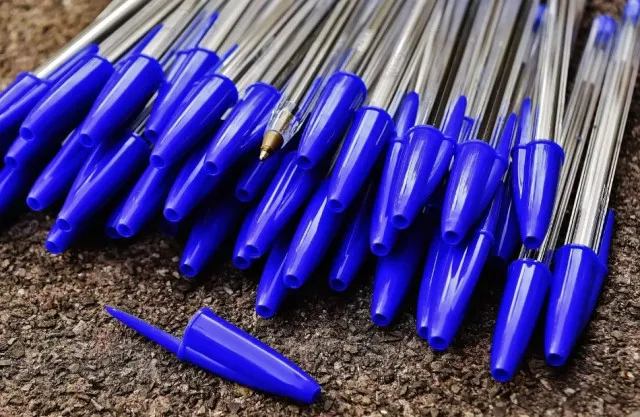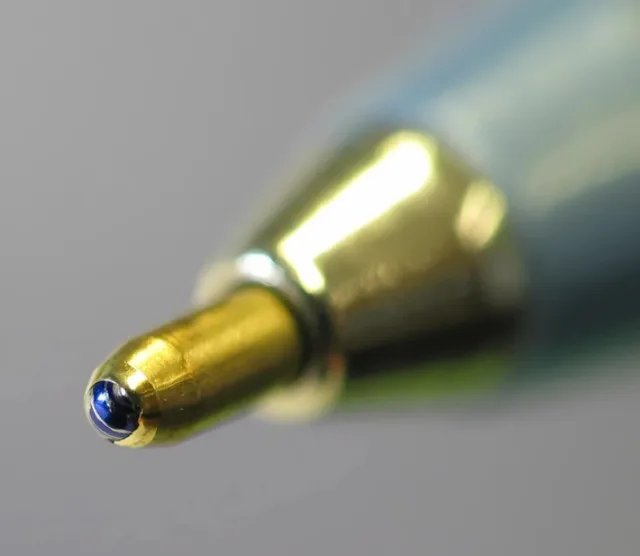In the glittering realm of celebrity culture, autographs hold a special place in the hearts of fans, providing a tangible connection to their favorite stars. However, a peculiar trend has taken root: many celebrities adamantly avoid using blue ink pens for their signatures. This seemingly inconsequential preference has sparked widespread curiosity. Is it simply a personal quirk, or is there a more pragmatic reason behind the aversion to blue ink?
The Mystery Behind Celebrities Avoiding Blue Ink

At first glance, the color of a pen when signing an autograph might seem trivial. Whether the signature is in blue or black should make no difference in its value, right? Not quite. A significant reason celebrities steer clear of blue ink pens is to fight forgery. Blue ink is easier to scan and replicate than black ink, making it the preferred choice for those looking to forge a celebrity’s signature.
In our digital era, where selling signed memorabilia online has become a booming business, the risk of fake autographs has surged. For celebrities, maintaining the authenticity of their signatures is paramount. Consequently, they increasingly favor black ink pens, as black ink is tougher to reproduce accurately, especially with advanced scanning technologies.
Claire Foy’s Viral Moment: “I Don’t Do Blue”
A viral incident spotlighted this issue when Claire Foy, renowned for her role as Queen Elizabeth II in The Crown, was caught on camera refusing to sign an autograph with a blue pen. When a fan presented her with the pen, Foy politely declined, stating, “I don’t do blue.” Her comment, though brief, puzzled many fans, leading to much speculation.
Some viewed her remark as a sign of arrogance or simply a personal preference, while others were genuinely curious. Was there more to Foy’s refusal to use blue ink? Indeed, her decision aligns with a growing trend among celebrities, driven by practical and professional concerns about forgery.
Forgery in the Digital Age: Why Blue Ink is a Risk
In the age of online marketplaces like eBay, signed memorabilia can fetch significant prices. A celebrity’s autograph, whether on an album cover, movie poster, or simple piece of paper, is a precious commodity. Thus, the autographed items are prime targets for forgery, with unscrupulous individuals trying to pass off fake signatures as authentic.
Blue ink poses a particular challenge because it’s easier to scan and digitally manipulate. Scanners can more effectively capture the nuances of blue ink, enabling counterfeiters to replicate signatures with high accuracy. To counter this, many celebrities now prefer black ink pens to make their autographs harder to duplicate.
Black Ink: The Celebrity’s Defense Against Forgery
To ensure the integrity of their signatures, celebrities are increasingly adopting black ink pens. Black ink is not only more difficult to scan but also creates a denser, more uniform appearance that’s tougher to replicate. This makes it more challenging for counterfeiters to pass off fake signatures as authentic, thereby preserving the value and authenticity of the original autograph.
For collectors and fans who treasure these signed items, the switch to black ink may appear minor. However, it’s a critical step in ensuring the legitimacy of the memorabilia they cherish. By using black ink, celebrities protect their reputation and brand while offering their fans genuine keepsakes.
Fans’ Reactions: From Amusement to Understanding

Claire Foy’s viral moment elicited a range of reactions from fans on social media. While some were amused by her offhand comment, others quickly grasped its underlying logic. Social media was abuzz with comments, many users reflecting on the practicality of avoiding blue ink for legal and professional reasons.
One fan noted, “Used to be that blue wasn’t good for photocopying, so originals couldn’t be copied,” while another remarked, “Blue ink is usually required for most documents so they can determine the original from the copy.” These comments underscored the historical importance of blue ink in distinguishing originals but also highlighted the modern risks it poses in the era of digital forgery.
Another user joked, “I saw a blue pen in a bad part of town once, and it was terrifying,” while others nostalgically recalled when copy machines could only replicate black ink. Overall, the conversation on social media revealed how a seemingly minor choice—opting for black ink over blue—can have significant implications in the world of celebrity autographs.
The Shift Towards Black Ink in Autograph Signing

The trend of celebrities using black ink is growing not only due to forgery concerns but also because black ink has become the industry standard for official signatures. Many legal documents, contracts, and important agreements mandate black ink to ensure clarity and authenticity, a standard that has extended to autograph signing.
Attorneys, managers, and agents often advise their celebrity clients to use black ink when signing anything that might hold value or be publicly displayed. This adds an extra layer of security, ensuring that the signature remains hard to duplicate. In the fast-paced world of celebrity culture, where every signed item could potentially end up on the auction block, such attention to detail is crucial.
Beyond the Ink: Protecting the Value of Autographs

While ink color is one way to protect autographs, celebrities and their teams employ several other measures to ensure the authenticity of their signatures. These include using personalized markers, holographic stickers, or official certificates of authenticity to accompany signed items. Some celebrities also collaborate with specialized companies to verify their signatures, making counterfeit efforts even more difficult.
Ultimately, whether it’s the use of black ink or other verification methods, celebrities are committed to ensuring their autographs remain genuine and valuable for their fans.
Conclusion: The Practicality Behind the Pen Choice
The choice to avoid blue ink when signing autographs might seem trivial, but it is deeply rooted in practicality. Celebrities are acutely aware of the risks of forgery and the importance of preserving the value of their signatures. By choosing black ink, they protect their autographs from easy reproduction, ensuring their fans receive authentic memorabilia.
So the next time you see a celebrity decline a blue pen in favor of black, you’ll understand that it’s not just about personal preference—it’s about maintaining the integrity of their signature and shielding their fans from forgeries. In the world of autographs, even the smallest detail, like the color of ink, can have significant repercussions.


